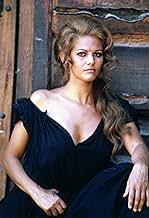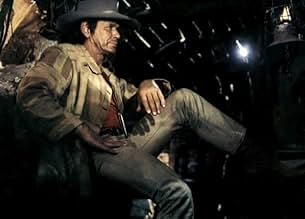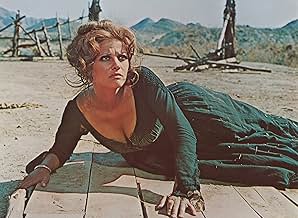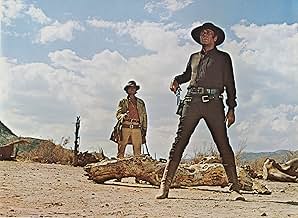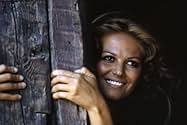Um misterioso estranho se junta com um bandido para proteger a uma viúva.Um misterioso estranho se junta com um bandido para proteger a uma viúva.Um misterioso estranho se junta com um bandido para proteger a uma viúva.
- Direção
- Roteiristas
- Artistas
- Prêmios
- 6 vitórias e 5 indicações no total
Livio Andronico
- Bit part
- (não creditado)
Salvatore Basile
- Member of Cheyenne's Gang
- (não creditado)
Aldo Berti
- Member of Frank's Gang Playing Poker
- (não creditado)
Regina Elena Bisio
- Old Woman in the Tavern
- (não creditado)
Joseph Bradley
- Train Station Master
- (não creditado)
Frank Braña
- Member of Frank's Gang Smoking Pipe at Auction
- (não creditado)
Marilù Carteny
- Mourner at Brett McBain's Funeral
- (não creditado)
Resumo
Reviewers say 'Once Upon a Time in the West' is acclaimed for Sergio Leone's masterful direction, stunning landscapes, and Ennio Morricone's iconic score. Strong performances by Henry Fonda, Charles Bronson, and Claudia Cardinale are highlighted. The film's slow-burning intensity, moral ambiguity, and unforgettable characters cement its status as a classic. Despite some critiques on pacing and length, its artistic depth, complex storytelling, and influence on the Western genre are widely recognized.
Avaliações em destaque
Thank god that I'm a Bronson fan. This was my first Leone movie, and dumb kid that I was, I actually watched it thinking I was in for a typical Bronson "vehicle"! Looking back I'm thankful, because if it wasn't for his involvement, I would never have discovered the beauty and majesty that is Once Upon a Time in the West.
I absolutely love this movie. It's probably my all time favourite, certainly one of the few that I can watch OVER and OVER again without losing interest. I love the way Leone creates intrigue and mystery around what is a relatively thin plot. He can make even the smallest twist of fate seem like an epic turn of events, with that amazing sense of revelation that he generates out of old hackneyed situations (something Argento has since picked up). Leone proves in this film that he could seemingly take anyone, even peripheral characters, and give them screen charisma without using dialogue as a crutch.
OUATITW features the most tense two man stand-offs ever, with some serious deja-vu in the direction of his "Dollars" trilogy. In fact, it does feel like those three movies were warm ups, practice sessions in the build up to OUATITW. Here though, he perfected everything; despite the long running time, it's all focused, and without a single irrelevant scene. For me, the two hours plus just fly by, I wish it would never end. Leone was without question at his artistic peak when he made this, that's not to say that he went downhill from then on, but I honestly don't think he ever did another film where everything came together so perfectly.
The cast is flawless. Fonda eclipsed every good guy he ever did in one fell swoop, truly chilling. Robards is a great comic character, the lovable rogue with an edge. And Cardinale is more than just (incredible) window dressing; she switches between passionate, angry, delicate and sentimental at all the right moments.
Which leaves the hero; I'm a huge Eastwood fan, but I honestly don't believe he could have done the role justice. His "man with no name" was a cool, sly character with hidden complexities. Eastwood always does these layered personalities, with some kind of mental baggage. Bronson, on the other hand, mostly does himself; simple, uncomplicated figures with only one state of mind, that's why he's put in so many revenge flicks. Plus, he looks like he's been seriously wronged at some point in his life, Eastwood doesn't have that quality. Bronson is the genuine hard-as-nails article. You can readily imagine that, had he been born decades earlier and been put in the same situation, he would resolve the problem in much the same way as his character in the movie (sometimes I affectionately refer to this movie as Deathwish part 0- could Harmonica be the great granddaddy of Paul Kersey?).
Of course the other great contribution is the music. I still think that the main theme is one of the most breathtaking pieces of music I have ever heard. It affects me deeply whenever I hear it, regardless of the mood I'm in. Maybe I should listen to more opera or something, I don't know, but that's the way I feel. And the individual character themes are just so well integrated into the film, it's unbelievable. Leone replaces words with music, and it conveys so much more in return. Bronson just plays that melancholy tune on the harmonica instead of answering people back, it consistently cracks me up.
High Noon, Naked Spur, Shane, The Searchers, etc. are all classics of the genre, but I really don't think it's possible to compare those "traditional" westerns with OUATITW. For me, it exists on a plane of it's own, it's the kind of film experience that you let wash over you, a waking dream. I recommend this movie to anyone, if you're on the right wavelength you'll be greatly rewarded.
I absolutely love this movie. It's probably my all time favourite, certainly one of the few that I can watch OVER and OVER again without losing interest. I love the way Leone creates intrigue and mystery around what is a relatively thin plot. He can make even the smallest twist of fate seem like an epic turn of events, with that amazing sense of revelation that he generates out of old hackneyed situations (something Argento has since picked up). Leone proves in this film that he could seemingly take anyone, even peripheral characters, and give them screen charisma without using dialogue as a crutch.
OUATITW features the most tense two man stand-offs ever, with some serious deja-vu in the direction of his "Dollars" trilogy. In fact, it does feel like those three movies were warm ups, practice sessions in the build up to OUATITW. Here though, he perfected everything; despite the long running time, it's all focused, and without a single irrelevant scene. For me, the two hours plus just fly by, I wish it would never end. Leone was without question at his artistic peak when he made this, that's not to say that he went downhill from then on, but I honestly don't think he ever did another film where everything came together so perfectly.
The cast is flawless. Fonda eclipsed every good guy he ever did in one fell swoop, truly chilling. Robards is a great comic character, the lovable rogue with an edge. And Cardinale is more than just (incredible) window dressing; she switches between passionate, angry, delicate and sentimental at all the right moments.
Which leaves the hero; I'm a huge Eastwood fan, but I honestly don't believe he could have done the role justice. His "man with no name" was a cool, sly character with hidden complexities. Eastwood always does these layered personalities, with some kind of mental baggage. Bronson, on the other hand, mostly does himself; simple, uncomplicated figures with only one state of mind, that's why he's put in so many revenge flicks. Plus, he looks like he's been seriously wronged at some point in his life, Eastwood doesn't have that quality. Bronson is the genuine hard-as-nails article. You can readily imagine that, had he been born decades earlier and been put in the same situation, he would resolve the problem in much the same way as his character in the movie (sometimes I affectionately refer to this movie as Deathwish part 0- could Harmonica be the great granddaddy of Paul Kersey?).
Of course the other great contribution is the music. I still think that the main theme is one of the most breathtaking pieces of music I have ever heard. It affects me deeply whenever I hear it, regardless of the mood I'm in. Maybe I should listen to more opera or something, I don't know, but that's the way I feel. And the individual character themes are just so well integrated into the film, it's unbelievable. Leone replaces words with music, and it conveys so much more in return. Bronson just plays that melancholy tune on the harmonica instead of answering people back, it consistently cracks me up.
High Noon, Naked Spur, Shane, The Searchers, etc. are all classics of the genre, but I really don't think it's possible to compare those "traditional" westerns with OUATITW. For me, it exists on a plane of it's own, it's the kind of film experience that you let wash over you, a waking dream. I recommend this movie to anyone, if you're on the right wavelength you'll be greatly rewarded.
In full silence, three mysterious men in long trench coats wait in a remote train station. Their faces have anticipation written all over them, even while the most interesting things they can find to do are toying with a fly, drinking water from a hat and cracking their fingers. A dog runs past. The windmill squeaks. The ticket vendor is locked away. The heath bounces off the wooden platform. The men sweat.
Are you bored yet? Then this movie is probably not for you.
But are you dying to know what the three men are waiting for? Does a light anxiety creep onto you whilst reading that description? Can't you wait for the tension to resolve? Then this movie is all you ever wanted.
The almost lawless world where outlaws and bandits roam the country with ease that is the setting of the story, is shown by Tonino Delli Colli (director of photography) in all its splendorous grandeur and it's uncountable little details. The set pieces, the costumes and the real life locations in Arizona and Utah make everything believable. And together with the characters and figurants, everything creates a vibrant and utterly believable Western civilisation.
Charles Bronson plays the man with the harmonica: a lone wolf looking for something that he chooses not to reveal to anyone until he gets it. A character with no name roaming the endless fields under the sun, announcing his presence at all times with the same melody he plays on his harmonica that echo's in an unsettling way. Bronson does this brilliantly, with a face that overflows with held back emotions and a determination that is downright scary.
In a tavern the man meets Manuel 'Cheyenne' Gutiérrez (Jason Robards), a bandit that recently escaped being hung by the neck, re-joining his band of outlaws. With already greying hair, he takes on the situation that arises in the area, trying his part to be the hero that saves the day. Robards portrays a character that, by only one look at him, we can see how the years have shaped him. His performance is outstanding; we want to grab a drink with Cheyenne, but we also get the feeling that being on your guard around him wouldn't be an overrated luxury.
The 'damsel in distress' (although she isn't in the original meaning of the word) Jill McBain (played by Claudia Cardinale) turns into a toy of Fate itself. Without any warning she gets involved in something quite over her head, but she handles it masterfully; she refuses to return to New Orleans with her tail between her legs and stays to face the difficulties put before her. Cardinale playing Jill is both an erotic marvel and a woman you wouldn't want to cross.
They are all opposed by Frank (Henry Fonda): the local gang leader with a heart of stone and a business proposal at the ready at all times. With his ruthless blue eyes and his gun at the ready he keeps the town quiet. Fonda gives you the creeps with just one gaze at the camera and every sentence leaves the bitter taste of malfeasance.
And finally, Gabriele Ferzetti finishes the line of main characters with his deliciously sickening portrayal of the crippled railroad baron Morton. A character that you'd like to slap in the face, but one you feel pity for as well. Outstandingly brought!
The soundtrack is composed by the never beaten maestro of film scoring himself: Ennio Morricone. His genius lies in the creation of themes and melodies that will haunt your dreams forever for better or worse. The melancholic main theme that is brought with a heavenly choir draws tears from your eyes after hearing only a couple of chords. The theme of the man with the harmonica is as unsettling as it is epic and Cheyennes' theme creates the lighter counter points in the movie. Morricone uses these motifs ingeniously, hinting at plot points, character motifs and feelings and giving you a sense of the world the movie takes place in. If I could give twelve out of ten stars for the score, I'd do it.
Sergio Leone was a masterful director, no need to prove that. He manages to turn even a scene of seven minutes, where three men are merely waiting for a train, into an epic storyline. Two hours and three quarters the tension builds and then resolves... partially, always building towards the end. And that finale! That finale! That finale chilled me to the bone! Throughout the film, question after question is raised, and when one question is answered, another one pops up. So when all pieces of the puzzle fall into place to the score of Ennio Morricone, how can one not be moved by it?
For Leone, there was no better way to reach the top of the Western genre.
And for us, there never will be a film that is more Western than 'Once Upon a Time in the West'.
Are you bored yet? Then this movie is probably not for you.
But are you dying to know what the three men are waiting for? Does a light anxiety creep onto you whilst reading that description? Can't you wait for the tension to resolve? Then this movie is all you ever wanted.
The almost lawless world where outlaws and bandits roam the country with ease that is the setting of the story, is shown by Tonino Delli Colli (director of photography) in all its splendorous grandeur and it's uncountable little details. The set pieces, the costumes and the real life locations in Arizona and Utah make everything believable. And together with the characters and figurants, everything creates a vibrant and utterly believable Western civilisation.
Charles Bronson plays the man with the harmonica: a lone wolf looking for something that he chooses not to reveal to anyone until he gets it. A character with no name roaming the endless fields under the sun, announcing his presence at all times with the same melody he plays on his harmonica that echo's in an unsettling way. Bronson does this brilliantly, with a face that overflows with held back emotions and a determination that is downright scary.
In a tavern the man meets Manuel 'Cheyenne' Gutiérrez (Jason Robards), a bandit that recently escaped being hung by the neck, re-joining his band of outlaws. With already greying hair, he takes on the situation that arises in the area, trying his part to be the hero that saves the day. Robards portrays a character that, by only one look at him, we can see how the years have shaped him. His performance is outstanding; we want to grab a drink with Cheyenne, but we also get the feeling that being on your guard around him wouldn't be an overrated luxury.
The 'damsel in distress' (although she isn't in the original meaning of the word) Jill McBain (played by Claudia Cardinale) turns into a toy of Fate itself. Without any warning she gets involved in something quite over her head, but she handles it masterfully; she refuses to return to New Orleans with her tail between her legs and stays to face the difficulties put before her. Cardinale playing Jill is both an erotic marvel and a woman you wouldn't want to cross.
They are all opposed by Frank (Henry Fonda): the local gang leader with a heart of stone and a business proposal at the ready at all times. With his ruthless blue eyes and his gun at the ready he keeps the town quiet. Fonda gives you the creeps with just one gaze at the camera and every sentence leaves the bitter taste of malfeasance.
And finally, Gabriele Ferzetti finishes the line of main characters with his deliciously sickening portrayal of the crippled railroad baron Morton. A character that you'd like to slap in the face, but one you feel pity for as well. Outstandingly brought!
The soundtrack is composed by the never beaten maestro of film scoring himself: Ennio Morricone. His genius lies in the creation of themes and melodies that will haunt your dreams forever for better or worse. The melancholic main theme that is brought with a heavenly choir draws tears from your eyes after hearing only a couple of chords. The theme of the man with the harmonica is as unsettling as it is epic and Cheyennes' theme creates the lighter counter points in the movie. Morricone uses these motifs ingeniously, hinting at plot points, character motifs and feelings and giving you a sense of the world the movie takes place in. If I could give twelve out of ten stars for the score, I'd do it.
Sergio Leone was a masterful director, no need to prove that. He manages to turn even a scene of seven minutes, where three men are merely waiting for a train, into an epic storyline. Two hours and three quarters the tension builds and then resolves... partially, always building towards the end. And that finale! That finale! That finale chilled me to the bone! Throughout the film, question after question is raised, and when one question is answered, another one pops up. So when all pieces of the puzzle fall into place to the score of Ennio Morricone, how can one not be moved by it?
For Leone, there was no better way to reach the top of the Western genre.
And for us, there never will be a film that is more Western than 'Once Upon a Time in the West'.
Once Upon a Time in the West (1968)
On the heels of "The Good, The Bad, and The Ugly," is this equally sprawling and archetypal Western, this time with less obvious dubbing, and Henry Fonda as a kind of tie in to Hollywood's hero paradigm. It's indescribably beautiful, one of the most gorgeous Westerns ever photographed, indeed a model for good visual directing and cinematography in any genre. That alone makes the almost three hours a pure pleasure.
But it's not a fast movie in any other way. It can't be. It depends on lingering over delicious details, small ones, shot up close in startling detail and ever deadpan looks and steely eyes. Nothing is believable and it's not meant to be. It's not even a fable, quite, but more a celebration of being inside an incredible film, as strange as that sounds. Not that the scenes are not believable--even the very last shots of the makeshift town and the railroad being built is about as realistic as it gets. Great stuff.
Plot? You might, at times, wonder where the plot went. There are lots of bad guys, and you're not totally sure there's a protagonist, unless the one woman in the movie is the center of our concerns, even if she is clearly a bystander to it all. When it gets clear, in the last twenty minutes, it's again archetypal (and has echoes of the over the tops showdown in "Good Bad and Ugly"). A small bit of slow motion (not needed normally in a movie where everything is slow already) makes clear this is the key moment in the film, the thing that made the rest of it, with all its confusing and violent layers, sensible.
For my money, I'd love all this incredible visceral stuff, the sounds and sights, filled in with some kind of deeply felt conflict, not a purely dramatic one. I watch and am shocked, or swept away, or impressed, or dazzled, but I'm actually never moved, not from the heart. And there are plenty of aspects here that should really move us--including feeling for the woman's plight, rather than simply recognizing that it is, after all, quite a plight.
Still, another landmark Sergio Leone movie.
On the heels of "The Good, The Bad, and The Ugly," is this equally sprawling and archetypal Western, this time with less obvious dubbing, and Henry Fonda as a kind of tie in to Hollywood's hero paradigm. It's indescribably beautiful, one of the most gorgeous Westerns ever photographed, indeed a model for good visual directing and cinematography in any genre. That alone makes the almost three hours a pure pleasure.
But it's not a fast movie in any other way. It can't be. It depends on lingering over delicious details, small ones, shot up close in startling detail and ever deadpan looks and steely eyes. Nothing is believable and it's not meant to be. It's not even a fable, quite, but more a celebration of being inside an incredible film, as strange as that sounds. Not that the scenes are not believable--even the very last shots of the makeshift town and the railroad being built is about as realistic as it gets. Great stuff.
Plot? You might, at times, wonder where the plot went. There are lots of bad guys, and you're not totally sure there's a protagonist, unless the one woman in the movie is the center of our concerns, even if she is clearly a bystander to it all. When it gets clear, in the last twenty minutes, it's again archetypal (and has echoes of the over the tops showdown in "Good Bad and Ugly"). A small bit of slow motion (not needed normally in a movie where everything is slow already) makes clear this is the key moment in the film, the thing that made the rest of it, with all its confusing and violent layers, sensible.
For my money, I'd love all this incredible visceral stuff, the sounds and sights, filled in with some kind of deeply felt conflict, not a purely dramatic one. I watch and am shocked, or swept away, or impressed, or dazzled, but I'm actually never moved, not from the heart. And there are plenty of aspects here that should really move us--including feeling for the woman's plight, rather than simply recognizing that it is, after all, quite a plight.
Still, another landmark Sergio Leone movie.
10daxsir
This is my fav film. It is more like watching a piece of art. The look is fantastic. The director does a perfect job. The acting is wonderful. The story is not the strongest ever but it should be watched to experience it. If your a film lover you can't fail but admire this film.Charles Bronson is the perfect broody loner. Henry Fonda surprises everyone by giving a strong performance as a bad guy. The close up of his eyes is stunning. The camera work and close ups have never been done better. The music is as good as anything you will find in a movie. Throw in the scenes when you first see Henry Fonda. The scene at the railway station which the water dripping on the hat. The sound of the spinning water tower. To me the closet movie to ART i have ever seen and i have seen a lot of films.
In the annals of western film lore, there are good and bad films. This is one of the finest. Because "Once Upon A Time in The West" is such a remarkable film, it is hard to define what makes it so memorable. The story centers on a beautiful former prostitute called Jill McBain (Claudia Cardinale) who arrives to assume the role of wife to a stubborn, crazy, red-headed Irishman with a dream. Waiting, instead is tragedy and 'Mr. Morton' who is a powerful, but ailing land grabbing baron (Gabriele Ferzetti) who desires to crush everything and everyone who stands in his way to reach the Pacific ocean with his railroad. To help him is an equally ruthless gunfighter named Frank (Henry Fonda; the success of this movie owes much to Fonda who plays a very convincing heavy) who has been removing obstacles for years and now targets the McBain family for death and that includes Jill. Unfortunately for Frank, he has accrued many enemies over the years with one particular, mysterious and deadly Harmonica playing stranger seeking revenge. Frank arranges for three of his best and fastest gun hands to meet and eliminate the stranger at the train-station. Joining the instrument playing stranger is an unpredictable, half-breed, renegade, who is a notorious gunfighter called 'Cheyenne.' ( Jason Robards ) The entire film is a triumph to the superb direction of Sergio Leone, who christens each major character with their own theme song. Each theme was created by Ennio Morricone and when the character makes an entrance, the theme prepares the audience for mood change, drama, action, and lifelong memories. Special guest appearances, by Woody Strode, Jack Elam, Keenan Wynn and Lionel Stander add to the classic nature of this excellent story. ****
Você sabia?
- CuriosidadesHenry Fonda originally turned down the role of Frank. Director Sergio Leone flew to the United States and met with Fonda, who asked why he was wanted for the film. Leone replied, "Picture this: the camera shows a gunman from the waist down pulling his gun and shooting a running child. The camera pans up to the gunman's face and...it's Henry Fonda" (until then, with one exception, Fonda had only been cast in "good guy" roles. Leone wanted the audience to be shocked).
- Erros de gravaçãoAs Frank and his gang ride away from the train, tire tracks are visible in the dirt.
- Cenas durante ou pós-créditosThe opening credits appear over the three gunmen waiting at the train station.
The film title itself appears at the end of the film.
- Versões alternativasFrank's line upon giving Harmonica his namesake varies from version to version. The Italian translates to "play something for your brother," but the most common English version is "keep your loving brother happy," and the German translates to "play me the song of death." The German movie title was inspired by this line.
- Trilhas sonorasDanny Boy
(1913) (uncredited)
Written by by Frederick Edward Weatherly
Hummed and sung a cappella a bit by Simonetta Santaniello
Principais escolhas
Faça login para avaliar e ver a lista de recomendações personalizadas
Detalhes
- Data de lançamento
- Países de origem
- Idiomas
- Também conhecido como
- Erase una vez en el oeste
- Locações de filme
- Empresas de produção
- Consulte mais créditos da empresa na IMDbPro
Bilheteria
- Orçamento
- US$ 5.000.000 (estimativa)
- Faturamento bruto nos EUA e Canadá
- US$ 5.321.508
- Faturamento bruto mundial
- US$ 5.435.312
Contribua para esta página
Sugerir uma alteração ou adicionar conteúdo ausente



